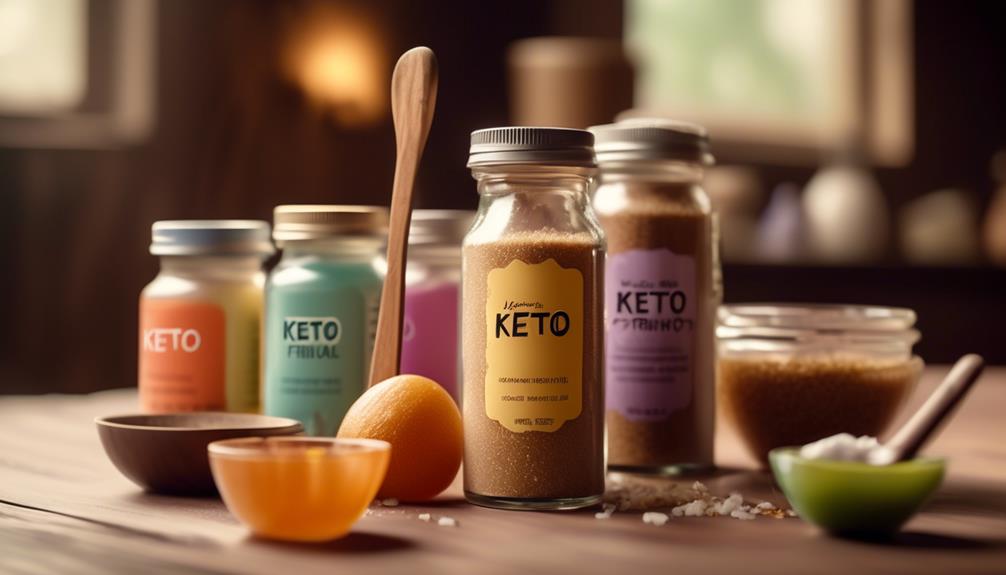Step into the sweet, low-carb world of keto baking, where the traditional ingredients take a backseat, and natural sweeteners become your guiding stars. Like an alchemist in the kitchen, you have the power to transform your favorite treats into guilt-free indulgences.
But where do you begin? Which natural sweeteners should you choose to create the perfect balance of flavor and healthiness? In this guide, you will uncover the secrets behind the most popular keto-friendly sweeteners, their unique properties, and how to use them in your baking creations.
Get ready to embark on a journey that will satisfy your cravings and revolutionize your keto baking game.
Understanding the Keto Baking Basics

To understand the basics of keto baking, you can begin by familiarizing yourself with the key principles and ingredients involved. Keto baking is a unique style of baking that focuses on low-carb and high-fat ingredients to create delicious treats that align with a ketogenic diet.
When it comes to keto baking, there are a few tips that can help you achieve the best results.
Firstly, it's important to choose the right sweeteners for your keto baking endeavors. Common keto sweeteners include erythritol, stevia, and monk fruit. These sweeteners are low in carbs and have minimal impact on blood sugar levels. They can be used as substitutes for traditional sugar in recipes, allowing you to enjoy sweet treats without compromising your keto goals.
Another tip for successful keto baking is to familiarize yourself with alternative flours. Traditional wheat flour is high in carbs, so it's important to use low-carb alternatives. Almond flour, coconut flour, and flaxseed meal are popular choices in keto baking. They provide a rich texture and flavor to your baked goods while keeping the carb count low.
The Benefits of Natural Sweeteners
Natural sweeteners offer a range of benefits that make them a healthier alternative to traditional sugar. Here are some reasons why incorporating natural sweeteners like honey into your diet can be beneficial:
- Healthier option: Natural sweeteners like honey contain essential nutrients, such as vitamins, minerals, and antioxidants, which can support overall health and wellbeing.
- Gentler on blood sugar: Unlike refined sugar, natural sweeteners have a lower glycemic index, meaning they cause a slower and steadier rise in blood sugar levels.
- Potential immune-boosting properties: Certain natural sweeteners, like raw honey, have been found to have antimicrobial and immune-boosting properties, which can help fight off infections and support a healthy immune system.
On the other hand, artificial sweeteners come with potential health risks. Here are a few reasons why you may want to avoid them:
- Risk of weight gain: Studies have shown that artificial sweeteners may disrupt hunger and satiety signals, leading to increased food cravings and potential weight gain.
- Potential negative impact on gut health: Some research suggests that artificial sweeteners can negatively affect the balance of gut bacteria, which plays a crucial role in digestion and overall health.
- Link to metabolic disorders: Artificial sweeteners have been associated with an increased risk of metabolic disorders such as type 2 diabetes and metabolic syndrome.
Exploring Stevia: A Keto-Friendly Option

Looking for a keto-friendly sweetener? Look no further than stevia. Stevia is a natural sweetener that provides sweetness without the calories. With its zero-calorie advantage, stevia can be a great option for those following a keto diet.
Plus, stevia is incredibly versatile and can be used in a variety of recipes and beverages.
Stevia's Natural Sweetness
Stevia, a keto-friendly option, offers a natural sweetness that can enhance the flavor of your favorite dishes and beverages. This natural sweetener has gained popularity due to its numerous health benefits and its minimal impact on blood sugar levels.
Here are some reasons why stevia is a great choice for those following a keto diet:
- Stevia has zero calories and zero carbohydrates, making it an ideal sugar substitute for those looking to reduce their calorie and carbohydrate intake.
- Studies have shown that stevia may help regulate blood sugar levels, making it a suitable option for individuals with diabetes or those concerned about their blood sugar levels.
- Unlike artificial sweeteners, stevia is derived from the leaves of the Stevia rebaudiana plant, making it a natural and plant-based sweetener.
Stevia's Zero-Calorie Advantage
With its zero-calorie advantage, stevia becomes an excellent choice for those on a keto diet, providing a guilt-free sweetness to your favorite dishes and beverages.
Stevia is a natural sweetener extracted from the leaves of the Stevia rebaudiana plant. One of the main advantages of stevia is its health benefits. Unlike other artificial sweeteners, stevia has been found to have no effect on blood sugar levels, making it suitable for individuals with diabetes or those following a low-carb diet.
Additionally, studies have shown that stevia may have antioxidant and anti-inflammatory properties, which can contribute to overall health and well-being. When comparing stevia to other artificial sweeteners, it stands out as a more natural option, as it's derived from a plant and undergoes minimal processing.
Stevia's Versatile Uses
Stevia offers a wide range of versatile uses, making it a popular choice for those following a keto diet. Here are some ways you can incorporate stevia into your meals:
- Sweetening beverages: Add a few drops of liquid stevia to your coffee, tea, or smoothies for a naturally sweet taste without the added calories.
- Baking: Use stevia as a replacement for sugar in your keto-friendly baked goods. It can be used in a powdered form or as a liquid, providing sweetness without the carbs.
- Savory dishes: Stevia can also be used in savory recipes, such as marinades, dressings, and sauces. It adds a touch of sweetness without compromising the flavor of your dishes.
In addition to its versatility, stevia offers health benefits such as being a natural, zero-calorie sweetener and having no impact on blood sugar levels.
The Versatility of Erythritol in Keto Baking

Erythritol, a versatile natural sweetener widely used in keto baking, offers a multitude of benefits for those following a low-carb diet. Not only does it provide a sweet taste without the added calories and carbohydrates, but it also has several health benefits.
One of the advantages of erythritol is that it can be used as a substitute for sugar in keto baking recipes. Its sweetness is similar to sugar, and it can be used in the same quantities, making it an easy replacement. Additionally, erythritol doesn't have an aftertaste like some other sugar substitutes, making it a popular choice among keto bakers.
In terms of health benefits, erythritol is a zero-calorie sweetener that doesn't raise blood sugar levels or insulin levels, making it suitable for those with diabetes or those following a low-carb diet. It also doesn't contribute to tooth decay, unlike sugar.
Erythritol is also easily digestible, as it's absorbed in the small intestine and excreted through urine without undergoing any metabolic changes. This means that it doesn't cause any digestive issues like bloating or gas.
Xylitol: a Sweetener With Dental Benefits
Xylitol, another natural sweetener with numerous dental benefits, can be a great alternative to traditional sugar in keto baking. Not only does it add sweetness to your recipes, but it also promotes dental health. Here are some of the dental health benefits of using xylitol in your baking:
- Reduces the risk of tooth decay: Xylitol isn't metabolized by bacteria in the mouth, which means it doesn't contribute to tooth decay like sugar does. In fact, it has been shown to inhibit the growth of harmful bacteria in the mouth.
- Stimulates saliva production: Xylitol stimulates the production of saliva, which helps to neutralize acids in the mouth and remineralize tooth enamel. This can help prevent cavities and promote overall oral health.
- Reduces plaque formation: Regular consumption of xylitol has been shown to reduce the formation of plaque on teeth, making it an effective tool in preventing gum disease.
Allulose: The Low-Calorie Sweetener for Keto

Allulose is a low-calorie sweetener commonly used in the keto diet that offers an alternative to traditional sugar while still satisfying your sweet tooth. It's a naturally occurring sugar that has been gaining popularity among people following the ketogenic lifestyle. One of the key benefits of allulose is its low glycemic index, which means it has little to no impact on blood sugar levels. This makes it a suitable option for individuals who need to manage their blood sugar levels or those who are following a low-carb or keto diet.
Not only does allulose have a low glycemic index, but it also has minimal calories. It contains only 0.2 to 0.4 calories per gram, which is about 90% less than regular sugar. This makes it an excellent choice for those looking to reduce their calorie intake while still enjoying sweet treats.
In addition to its low glycemic index and calorie content, allulose has also been found to have potential digestive health benefits. Studies suggest that allulose may help promote healthy gut bacteria and improve digestive function. It has been shown to have prebiotic properties, which means it can serve as a food source for beneficial bacteria in the gut.
Other Natural Sweeteners to Consider
When exploring natural sweeteners, there are several options to consider that can provide a healthier alternative to traditional sugar. Here are some other natural sweeteners you may want to consider:
- Monk Fruit Extract: Monk fruit extract is derived from the monk fruit, also known as Luo Han Guo. It's a zero-calorie sweetener that has been used in traditional Chinese medicine for centuries. Monk fruit extract is known for its intense sweetness, often being 100 to 250 times sweeter than sugar. It contains natural compounds called mogrosides, which provide the sweet taste without adding any calories or carbohydrates.
- Coconut Sugar: Coconut sugar is a natural sweetener made from the sap of coconut palm trees. It's a popular alternative to regular sugar due to its low glycemic index and high mineral content. Coconut sugar contains small amounts of vitamins and minerals like iron, zinc, calcium, and potassium. It also contains inulin, a type of fiber that can help slow down the absorption of sugar into the bloodstream.
- Alternatives: If monk fruit extract and coconut sugar don't suit your taste or dietary needs, there are other natural sweeteners you can try. Stevia is a plant-based sweetener that's calorie-free and has a glycemic index of zero. Erythritol is a sugar alcohol that provides sweetness without the calories or blood sugar spike. Xylitol is another sugar alcohol that's commonly used as a sweetener and has been shown to have dental health benefits.
Conclusion
In conclusion, when it comes to keto baking, natural sweeteners offer a delicious and healthy alternative to traditional sugars.
Stevia, erythritol, xylitol, and allulose provide sweetness without spiking blood sugar levels, making them perfect for those following a ketogenic diet.
Whether you're craving cookies, cakes, or bread, these natural sweeteners can satisfy your sweet tooth while keeping you on track with your health goals.
So go ahead, indulge in guilt-free keto treats and enjoy the benefits of these natural sweeteners.







